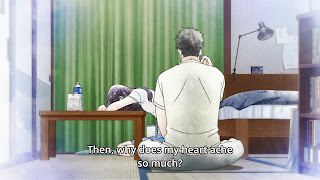The last scene in this episode, which was the Kageyama
setter dump, made great use of foreground framing to put focus on the character
on screen and to also create continuity. The characters on play were used for
foreground framing; by doing this the viewers become aware of the other parts
of the play developing despite not being the focus of the shot. This viewer
awareness was essential in creating a sense of continuity, which was very
important for the misdirection the scene was going for.
The first image (top-left) is the beginning of the play,
with Hinata acting as the first decoy. Kageyama is also on screen, this helps
with the continuity in the next shot (top-right) where his body is used for
foreground
framing. The focus of this shot is the Aoba player witnessing the play develop,
which is in the third shot (bottom-left). In this shot Tanaka is the second
decoy, again Kageyama is being used to frame the shot for continuity purposes.
The fourth image continues Tanaka’s action.
This sequence is the next phase of the play where Asahi acts
as the spiker. The first image (top-left) continues to reinforce continuity with
Hinata in the foreground still acting as the first decoy. In the next shot (top-right),
Hinata is used to frame and put focus on Asahi as he’s about to spike. This of
course never happened as we see in the next image (bottom left) where Kageyama
executes the setter dump. In the following shot (bottom-right), Kageyama is
again used for
foreground framing (continuity!) to highlight the shock on the
opponent’s face.
The storyboarding also helped a lot with creating continuity,
specifically the good use of
eyeline matches.










Comments
Post a Comment